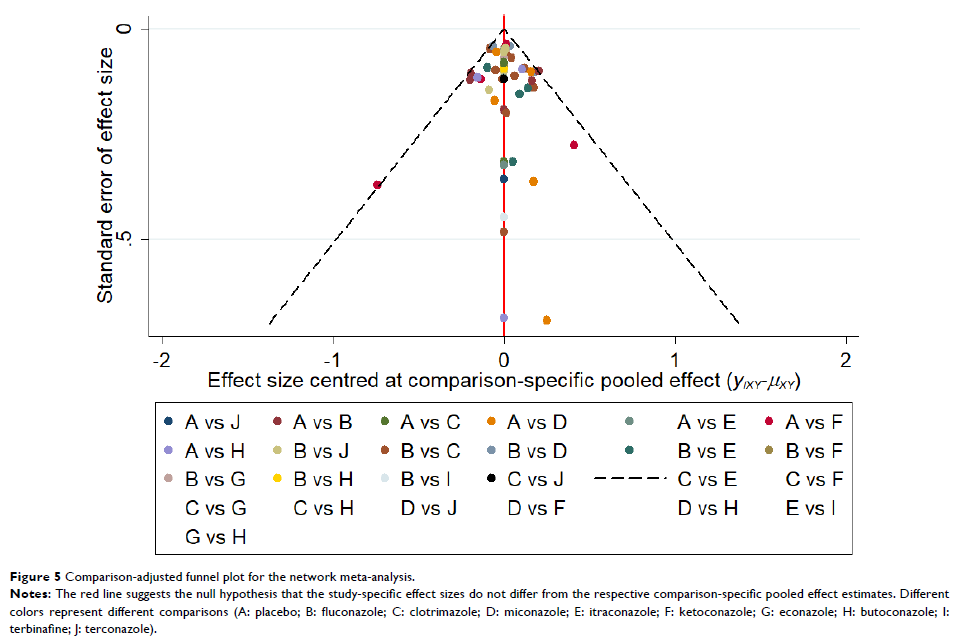108605
论文已发表
注册即可获取德孚的最新动态
IF 收录期刊
- 3.4 Breast Cancer (Dove Med Press)
- 3.2 Clin Epidemiol
- 2.6 Cancer Manag Res
- 2.9 Infect Drug Resist
- 3.7 Clin Interv Aging
- 5.1 Drug Des Dev Ther
- 3.1 Int J Chronic Obstr
- 6.6 Int J Nanomed
- 2.6 Int J Women's Health
- 2.9 Neuropsych Dis Treat
- 2.8 OncoTargets Ther
- 2.0 Patient Prefer Adher
- 2.2 Ther Clin Risk Manag
- 2.5 J Pain Res
- 3.0 Diabet Metab Synd Ob
- 3.2 Psychol Res Behav Ma
- 3.4 Nat Sci Sleep
- 1.8 Pharmgenomics Pers Med
- 2.0 Risk Manag Healthc Policy
- 4.1 J Inflamm Res
- 2.0 Int J Gen Med
- 3.4 J Hepatocell Carcinoma
- 3.0 J Asthma Allergy
- 2.2 Clin Cosmet Investig Dermatol
- 2.4 J Multidiscip Healthc

抗真菌药物治疗外阴阴道念珠菌病的疗效:贝叶斯网络荟萃分析
Authors Qin F, Wang Q, Zhang C, Fang C, Zhang L, Chen H, Zhang M, Cheng F
Received 28 May 2018
Accepted for publication 23 August 2018
Published 17 October 2018 Volume 2018:11 Pages 1893—1901
DOI https://doi.org/10.2147/IDR.S175588
Checked for plagiarism Yes
Review by Single-blind
Peer reviewers approved by Dr Cristina Weinberg
Peer reviewer comments 3
Editor who approved publication: Dr Joachim Wink
Purpose: Antifungal drugs are used frequently in the treatment of vulvovaginal
candidiasis (VVC), but have shown controversial results. In this study, we
aimed to evaluate the effectiveness of different antifungal drugs in the
treatment of VVC and to provide an evidence-based reference for clinical use.
Methods: The published studies on the effectiveness of antifungal drugs in
the treatment of VVC (up to April 2018) were retrieved from PubMed, Embase, the
Cochrane Library, and ClinicalTrials.gov. We sifted through the literature
according to Patients, Interventions, Comparisons and Outcomes principle,
extracted data on the basic characteristics of the study, and evaluated the
quality of included studies. We used R software for statistical analysis.
Results: In total, 41 randomized controlled trials were included in this
meta-analysis. The relative risk of VVC associated with ten drugs, including
placebo, fluconazole, clotrimazole, miconazole, itraconazole, ketoconazole,
econazole, butoconazole, terbinafine, and terconazole, was analyzed. The following
drugs appeared to show more efficacy than placebo in the treated patients:
fluconazole (OR =6.45, 95% CrI 4.42–9.41), clotrimazole (OR =2.99, 95% CrI
1.61–5.55), miconazole (OR =5.96, 95% CrI 3.17–11.2), itraconazole (OR =2.29,
95% CrI 1.21–4.33), ketoconazole (OR =2.40, 95% CrI 1.55–3.71), butoconazole
(OR =1.18, 95% CrI 1.06–1.31), and terconazole (OR =5.60, 95% CrI 2.78–11.3).
The value of surface under the cumulative ranking curve of each drug was as
follows: placebo (0.5%), fluconazole (91.5%), clotrimazole (61.8%), miconazole
(33.8%), itraconazole (50.5%), ketoconazole (42.8%), econazole (46.8%),
butoconazole (82.2%), terbinafine (20.9%), and terconazole (65.0%).
Conclusion: Antifungal drugs are effective in the treatment of VVC.
Fluconazole appeared to be the best drug for the treatment of VVC according to
our analysis.
Keywords: vulvovaginal candidiasis, antifungal drugs, randomized controlled
trials, network meta-analysis
